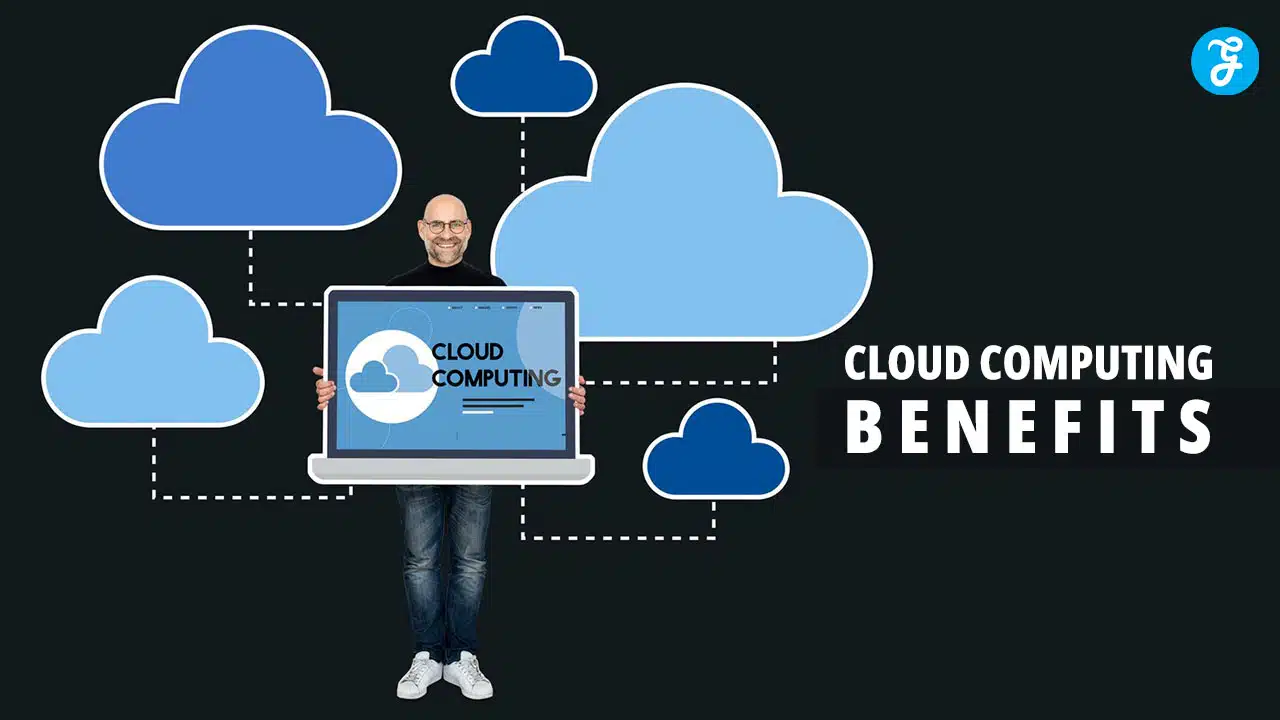Cloud computing has changed how businesses use technology. It lets companies access powerful tools and storage over the internet instead of buying expensive hardware. Many firms now rely on cloud services for their daily operations.
Cloud computing offers many benefits that can help businesses save money and work more efficiently. You can scale your resources up or down quickly as needed.
This flexibility is great for growing companies. Cloud solutions also make working together easier for teams from different locations. You can access your files and apps from anywhere with an internet connection.
1. Scalability
Cloud computing lets you easily adjust resources as your needs change. You can quickly add more power when traffic spikes. This means your systems won’t crash during busy times.
You can also scale down when demand drops. This saves money since you only pay for what you use. Cloud scalability works for both computing power and storage.
There are two main types of scaling. Vertical scaling adds more power to existing servers. Horizontal scaling adds more servers to spread out the workload.
Many cloud services can scale automatically. They detect increased demand and add resources on their own. This hands-off approach saves you time and effort.
Scalability helps businesses of all sizes. Small companies can start small and grow as needed. Large enterprises can handle huge workloads without buying tons of hardware.
With cloud scalability, you’re always ready for what comes next. Your IT can grow with your business without significant upfront investments.
2. Cost Efficiency
Cloud computing can help you save money in several ways. You don’t need to buy expensive hardware or software upfront. Instead, you pay only for what you use.
This means lower costs for small businesses and startups. You can scale up or down quickly as your needs change. You are no longer wasting money on unused resources.
Cloud providers handle maintenance and updates. This cuts down on IT staff costs. You also save on energy bills since you’re not running your data center.
With cloud computing, you can turn capital expenses into operational expenses. This improves cash flow and makes budgeting easier.
Many cloud services offer pay-as-you-go pricing. This lets you control costs and avoid long-term commitments. You can try new tools without significant investments.
Cloud solutions often come with built-in security features. This can reduce what you spend on separate security measures.
3. Disaster Recovery
Cloud-based disaster recovery offers a lifeline for businesses. It helps you bounce back quickly after unexpected events. With cloud solutions, you can protect your data and systems more efficiently.
Cloud disaster recovery is flexible and scalable. You can adjust your plan as your needs change. This means you’re always prepared, no matter how your business grows.
These solutions are often more cost-effective than traditional methods. You don’t need to invest in expensive hardware or maintain a separate physical site. Instead, you pay for what you use.
Cloud-based recovery also improves accessibility. You can access your backup data from anywhere with an internet connection. This is crucial when your main office is unavailable.
Security is another crucial benefit. Cloud providers offer advanced encryption and access controls. These features help keep your data safe during the recovery process.
You can set up backup sites in different locations with cloud disaster recovery. This spread-out approach reduces the risk of losing everything in one incident.
4. Accessibility
Cloud computing makes digital resources available to more people. With an internet connection, you can access cloud-based apps and data from almost any device. This means you’re not tied to a single computer or location.
People with disabilities benefit from cloud technologies, too. Special software and tools in the cloud help those with visual, hearing, or mobility challenges use computers more easily.
Cloud services let you work from anywhere. This flexibility is excellent for people who can’t always visit an office. You can do your job from home or while traveling.
Many cloud apps have built-in accessibility features. These include options like text-to-speech, closed captions, and screen readers. Such tools make it easier for everyone to use technology.
Cloud computing also helps spread new accessibility innovations quickly. When a helpful feature is added to a cloud service, all users can access it immediately. You don’t need to update or replace your devices.
5. Security Enhancements
Cloud computing offers significant security upgrades for your business. Cloud providers invest heavily in protection, using their large scale to build robust defenses. This means you get enterprise-grade security without the high costs.
Your data stays safer in the cloud. Providers use strong encryption to keep information secure in storage and transfer. They also have teams of experts working around the clock to stop threats.
Access control gets more accessible, too. Cloud platforms let you set detailed permissions for who can view or change data. You can quickly add or remove access as needed.
Automatic updates keep your systems protected. Cloud providers handle patching and upgrades, so you always have the latest security fixes. This saves you time and reduces risks from outdated software.
Disaster recovery improves with cloud solutions. Your data gets backed up across multiple locations. If one site has issues, others can take over seamlessly. This helps keep your business running even during emergencies.
6. Automatic Updates
Cloud computing takes the hassle out of software updates. You no longer need to worry about manually installing patches or new versions.
The cloud provider handles all updates behind the scenes. Your systems always run the latest software with the newest features and security fixes.
You save time and effort by not having to manage updates yourself. Your IT team can focus on more important tasks instead of maintaining software versions.
Automatic updates also reduce risks. Old, unpatched software can have security holes. Cloud services protect you against known vulnerabilities when fixes are available.
The update process is smooth and doesn’t disrupt your work. Updates often happen outside business hours, so you may not notice them.
Some cloud providers let you control when updates occur. This gives you flexibility to choose convenient times for your business.
Cloud solutions make staying current more accessible. You always have access to the newest tools and capabilities without extra work.
7. Collaboration Tools
Cloud-based collaboration tools make teamwork easier. You can work together on projects from anywhere. These tools let you share files, chat, and edit documents simultaneously.
Popular options include Google Workspace and Microsoft Office 365. They offer shared calendars, video calls, and file storage. This helps teams stay connected and productive.
With cloud collaboration, you don’t need to email files back and forth. Everything is updated in real time. This cuts down on confusion and keeps everyone on the same page.
These tools also help with hiring new people. You can easily share important documents and training materials. New team members can get up to speed quickly.
Many collaboration tools have mobile apps, too. This means you can join meetings or check updates from your phone. It’s perfect for busy professionals on the go.
Security is also a key feature. Cloud providers use strong encryption to keep your data safe. You can control who sees what, giving access only to those who need it.
8. Flexibility
Cloud computing gives you the power to scale up or down quickly. You can adjust your resources based on what you need at any given time. This means you don’t have to guess how much capacity you’ll need in the future.
Need more storage space? You can get it in minutes. Want to try out a new app? You can set it up fast without buying new hardware. Cloud services let you experiment and innovate without significant upfront costs.
You can access your data and apps from anywhere with an internet connection. This makes it easier to work from home or while traveling. Your team can collaborate no matter where they are.
Cloud platforms often offer a wide range of services, too. You can pick and choose the ones that fit your needs. As your business grows, you can add new features without significant changes to your IT setup.
This flexibility helps you respond to market changes quickly. You can launch new products or services faster than with traditional IT systems. Cloud computing adapts to your business, not the other way around.
9. Environmental Impact
Cloud computing can help reduce your carbon footprint. You save energy by using shared data centers compared to running your servers.
These centers use less power overall. They have better cooling systems and more efficient hardware. This means lower electricity use for the same computing tasks.
You can also scale resources up or down as needed. This prevents wasting energy on idle servers. Cloud providers often use renewable energy, too, further cutting emissions.
Moving to the cloud can shrink your IT energy use by up to 25%. That’s a significant drop in your company’s environmental impact.
Cloud computing also enables remote work. This cuts down on commuting and office energy use. You save fuel and reduce pollution from transportation.
By choosing a green cloud provider, you support sustainability efforts. Many have goals to use 100% renewable energy—some already run carbon-neutral operations.
10. Performance Optimization
Cloud computing lets you boost your system’s speed and efficiency. You can quickly scale resources up or down to match your needs. This means your apps run smoothly even during busy times.
Cloud providers offer tools to monitor and improve performance. You can see how your systems are working in real time. This helps you spot and fix issues quickly.
With cloud services, you get access to powerful hardware. This can make your apps and websites load faster. Your customers will have a better experience.
You can also use cloud-based caching and content delivery networks. These spread your data across many servers. This cuts down on loading times for users all over the world.
Cloud platforms often have built-in load balancing. This spreads traffic evenly across servers. It prevents any single server from getting overloaded.
By moving to the cloud, you can focus on making your apps better. You don’t have to worry about managing hardware. This lets you spend more time on improving performance.
Understanding Cloud Computing
Cloud computing changes how businesses use technology. It offers flexibility and cost savings. Let’s explore what it means and how it works.
Definition and Overview
Cloud computing lets you access computer resources over the internet. Instead of owning servers, you rent them from a provider. This includes storage, processing power, and software. You can scale up or down as needed.
Cloud services are like utilities. You pay for what you use, similar to electricity or water. This model helps businesses save money on IT costs. It also makes it easier to try new technologies without significant upfront investments.
Public vs. Private Cloud
Many users share public clouds. Companies like Google, Amazon, and Microsoft run them. They’re easy to start using and often cheaper. But you have less control over security.
Private clouds are used by one organization only. They offer more control and can be more secure. But they cost more to set up and run. Some businesses use both types in a hybrid approach.
Public clouds work well for most small businesses. Large companies or those with strict data rules often choose private clouds.
Cost Efficiency
Cloud computing offers significant cost savings for businesses. It reduces upfront expenses and allows for flexible spending based on actual usage.
Reduced IT Costs
Cloud solutions cut down on hardware and infrastructure costs. You don’t need to buy expensive servers or maintain a data center. This saves money on equipment, power, and cooling. Cloud providers handle upgrades and maintenance, reducing IT labor costs.
Many businesses see lower overall IT spending after moving to the cloud. You can scale resources up or down as needed, avoiding waste. This flexibility is beneficial for growing companies or those with seasonal demand.
Pay-As-You-Go Models
Cloud services often use a pay-as-you-go pricing model. You only pay for the resources you use. This differs from traditional IT, where you might buy more capacity than needed “just in case.”
This model turns IT spending from a significant upfront cost to a predictable monthly expense. It’s easier to budget and manage cash flow. You can try new services without substantial investments.
Pay-as-you-go also lets you experiment with new ideas cheaply. If a project doesn’t work, you’re not stuck with expensive unused hardware.
Scalability and Flexibility
Cloud computing lets you easily adjust resources as your needs change. You can quickly add or remove computing power, storage, and other capabilities.
On-Demand Resources
Cloud platforms give you access to a vast pool of resources. You can get more servers, storage, or network capacity in minutes. This means you don’t have to buy and set up new hardware when your needs grow.
You only pay for what you use. If a big project comes up, you can ramp up quickly. When it’s done, you can scale back down. This saves money compared to owning all that equipment yourself.
Many cloud providers offer auto-scaling. Your resources adjust automatically based on demand. This keeps your apps running smoothly, even during traffic spikes.
Elasticity
Cloud elasticity means your resources can stretch or shrink fast. It’s like a rubber band that adjusts to fit what you need at any moment.
Your apps can handle sudden bursts of activity. The cloud immediately adds capacity if you get a flood of new users. When things slow down, it removes extra resources.
This flexibility helps in many ways:
- Your website stays up during big sales or events
- You can run complex analyses only when needed
- Dev teams can spin up test environments quickly
Elasticity makes your IT more agile. You adapt to changes without wasting money on unused capacity.
Improved Collaboration
Cloud computing makes teamwork more accessible and more efficient. It allows people to work together from anywhere and at any time.
Accessibility
You can access files and projects from any device with an internet connection. You can work from home, the office, or while traveling. Cloud storage keeps everything in one place, so you don’t need to email files back and forth. You always have the latest version of documents at your fingertips. This saves time and reduces confusion.
Cloud systems also make sharing easy. You can give team members access to specific files or folders with a few clicks. This helps keep projects organized and ensures everyone has what they need to do their job.
Real-Time Collaboration Tools
Cloud platforms offer tools that let multiple people work on the same document simultaneously. You can see changes and chat with coworkers inside the document. This speeds up the editing process and cuts down on meetings.
These tools often include:
- Shared calendars
- Video conferencing
- Task management boards
- Instant messaging
With these features, you can brainstorm, plan projects, and solve problems together in real time. This leads to faster decision-making and better results for your team.
Security and Compliance
Cloud computing offers substantial security benefits for businesses. Cloud providers invest heavily in protecting their systems. They use advanced tools and methods to keep data safe.
You get better protection in the cloud than you could set up alone. Cloud providers have teams of experts working around the clock on security. They use encryption to scramble data and keep it private.
The cloud makes it easier to follow rules and regulations, too. Many providers offer built-in compliance features. These help you meet industry standards and legal requirements.
Some critical security advantages of cloud solutions include:
- Regular security updates and patches
- Data backups and disaster recovery
- Access controls and user authentication
- Network security and firewalls
- 24/7 monitoring for threats
Cloud providers also have certifications showing they meet strict security standards. This gives you peace of mind that your data is in good hands.
With cloud security, you can focus on your business instead of worrying about threats. The provider handles most of the security work for you. This saves time and money while keeping your data safe.
Takeaways
Cloud computing offers numerous benefits that revolutionize how modern businesses operate. It provides scalability, allowing companies to adjust resources as needed and enhancing cost efficiency by eliminating the need for expensive hardware and maintenance.
With cloud-based disaster recovery, businesses can quickly recover from unexpected events, ensuring data protection and operational continuity. Enhanced accessibility enables remote work and collaboration while robust security measures safeguard sensitive information.
Automatic updates, performance optimization, and flexibility further streamline operations. The environmental impact is also reduced, making cloud computing a sustainable choice.
By leveraging these advantages, businesses can improve efficiency, reduce costs, and stay competitive in an ever-evolving digital landscape.







































